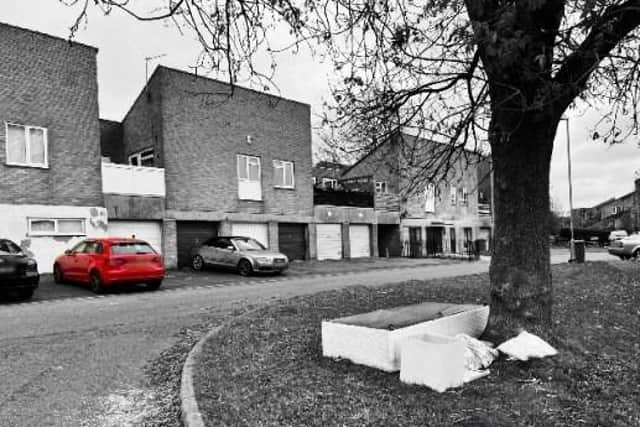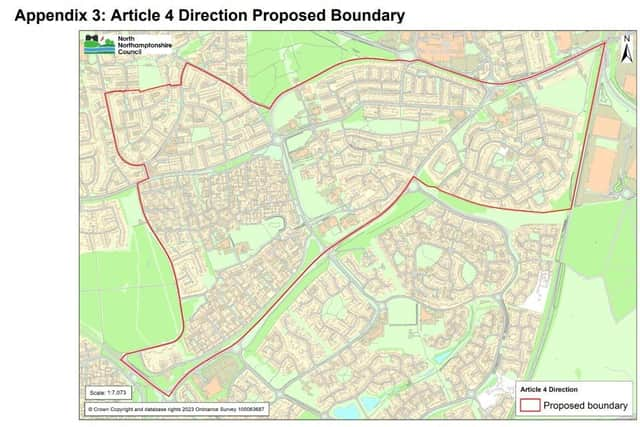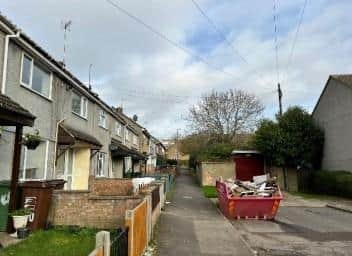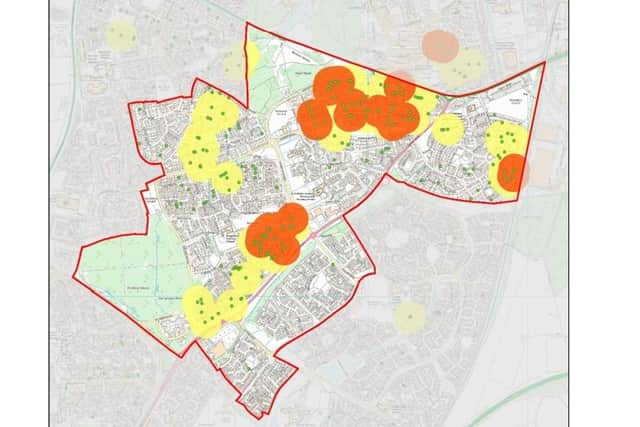Major crackdown on HMOs on Corby estates after Northants Telegraph campaign


Houses in multiple occupation in a large area of Corby will be subject to much stricter planning controls following a campaign by this newspaper.
North Northamptonshire Council yesterday (April 20) ratified a plan to bring in tough restrictions on HMOs following our two-year push for action.
Advertisement
Hide AdAdvertisement
Hide AdA Northants Telegraph investigation was launched back in 2021 after our reporter discovered that would-be landlords had been attending crash courses in London where they were being advised to buy-up cheap Corby properties and convert them into houses for rent.


People on several estates told our reporters they felt over-run and that their sense of community was being eroded by the proliferation of short-term, transient renters.
Backed by the town’s MP Tom Pursglove, we called for an Article 4 Direction to be made, which would mean that any HMO with more than three people living in it would have to go through the full planning permission process.
In the days after our investigation, North Northamptonshire Council pledged to launch their own probe in the effect of HMOs on our communities. The issue was raised in the council chamber by Cllr Zoe McGhee (Lab, Kingswood) who led the authority’s work on Left Behind Areas.
Advertisement
Hide AdAdvertisement
Hide AdTheir findings, compiled after 18-months of scrutiny, showed there were six wards across North Northamptonshire that were badly affected – Kingswood and Hazel Leys; Corby North; Cover Hill and Northall in Kettering; Finedon Ward and Croyland & Swanspool in Wellingborough.


And at yesterday’s NNC Executive meeting, senior councillors accepted detailed recommendations from officers to implement an Article 4 Direction in the worst hit area – Kingswood ward in Corby.
It means that any HMO on Kingswood, Hazel Leys, Exeter and parts of the Beanfield estate with three beds or more will now have to go through the scrutiny of the planning process.
James Cuff, a resident of Hazel Leys ward has been instrumental in backing our campaign for an Article 4 Direction. He said that although he is pleased at the news, there is still work to do. He said: “NNC needs to now look at the existing HMO's. They need to reduce the number. They have granted licenses to properties next to each other, streets with three or more HMOs in them.
Advertisement
Hide AdAdvertisement
Hide Ad"They should look at parking. Most of all we should have the right to object to a property being granted a licence. Too many family homes have been lost, community spirit has gone.


"These people in power need to understand we put them there and at the next election we can vote them out.”
Cllr McGhee said: “Residents have been demanding action for years and I am pleased the executive have listened to the concerns of the constituents I represent.
"I will continually monitor this and see how this policy works and hopefully going forward we can move this into other parts of North Northants.”
What is an HMO?
Advertisement
Hide AdAdvertisement
Hide AdA house in multiple occupation is any property occupied by at least three people who are not from one household but share facilities like the kitchen or bathroom.
A small HMO is defined as a dwelling that is occupied by between three and six unrelated people who share basic amenities such as a kitchen or bathroom. Family houses have previously been allowed to change to small HMOs without the need to gain planning permission under permitted development rights.
A large HMO is defined as a property that is occupied by more than six unrelated adults who share basic amenities such as a kitchen or bathroom. The creation of a large HMO requires planning permission.
What does the Article 4 Direction mean?
The report to officers, written by NNC Executive Director of Place and Economy George Candler, states that the Article 4 Direction will allow planning control to determine small HMO applications on a case-by-case basis.
Advertisement
Hide AdAdvertisement
Hide AdIt says many of the HMOs that are raising concerns in the local community are ‘small’, benefiting from the associated permitted development rights, which currently fall outside planning controls.
The new rules will also allow officers to respond to the concerns of locals who are worried about concentration of HMOs.
Every HMO planned for the area covered by Article 4 will now go through the planning process – meaning residents and ward councillors will have to be consulted before on is given permission.
The Article 4 Direction will be subject to a 12-month lead-in period before it becomes effective to avoid compensation claims by landlords, so it’s hoped it will be operational by April 24.
Advertisement
Hide AdAdvertisement
Hide AdThere will also need to be a public consultation that will be carried out in the next six weeks.
As well as the Article 4 Direction, NNC have also agreed to formulate policy in the North Northamptonshire Strategic Plan which aims to manage HMO development across the whole unitary authority area.
What did the council’s investigation show?
A forensic investigation by planning officers showed there were 442 licensed HMOs in North Northants. Only those with more than five bedrooms need a licence, which is separate from planning permission.
In total, there are thought to be 985 small and large HMOs, licensed and unlicensed. The number of licensed HMOs has decreased in the past 12 months, but unlicensed HMOs have increased.
Advertisement
Hide AdAdvertisement
Hide AdThe highest proportion is in the Kingswood ward, where there are 202 HMOs, representing 2.5 per cent of all the homes there.
Kingswood attracted the highest number of environmental complaints during the NNC investigation. Officers found concentrations of HMOs at greater than 10 per cent of properties in Blenheim Walk, Constable Road, Croyde Avenue, Daniel Walk, Exmouth Avenue, Gainsborough Road, Holyrood Walk, Kensington Walk, Landseer Court, Llewellyn Walk, Rossetti Road, Spencer Walk and Westminster Walk.
The majority of respondents told officers that their main concerns were a change in the character of the area, poor appearance of the properties and car parking problems.
Their findings mirrored those of our own investigation which saw reporters manually comb through licensing and planning documents to discover where HMOs were becoming an issue.
At yesterday’s executive meeting, senior councillors welcomed the report and voted to back the recommendations.
